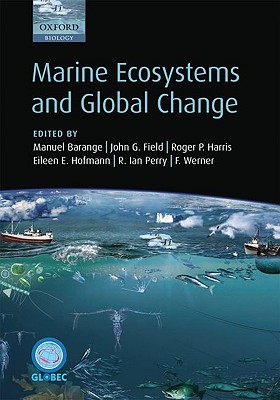 [Here’s my review, recently published in the Quarterly Review of Biology, of an excellent new book on the complex structure and dynamics of marine ecosystems and their responses to ongoing climate change. ]
[Here’s my review, recently published in the Quarterly Review of Biology, of an excellent new book on the complex structure and dynamics of marine ecosystems and their responses to ongoing climate change. ]
The scarcity of large vertebrates in graduate oceanography curricula has long perplexed new students and other naifs, given the centrality of fishing in humanity’s interaction with the ocean. Here at last is a book that addresses this paradox, synthesizing a decade of research by the international GLOBEC (Global Ocean Ecosystem Dynamics) program that aimed “to advance our understanding of the structure and functioning of the global ocean ecosystem . . . to forecast the responses of the marine ecosystem to global change.” The opening chapters provide an outstanding overview of the global ocean as a complex system sensitive to the interacting influences of climate and human activities. But the book’s title advertises only one of its twin foci: GLOBEC was revolutionary in its concerted effort to link physics all the way up to fishes, birds, and even whales. In an important sense, GLOBEC initiated the oceanography of animals, an ambitious effort that has clearly been highly productive.
Importantly, the book is more than a celebration of GLOBEC: it could serve as a textbook for a dawning era in which global change is the new normal. GLOBEC’s central focus on “target species” of animals inherently grappled with complex organismal biology, and the book accordingly shows a welcome convergence of classical box-model oceanography with community ecology. Recognizing the pervasive importance of top-down control and of organismal traits represents a major advance in biological oceanography. Equally important is the integration of humans, via both fishing and climate change. The book highlights the sobering complexity of marine ecological dynamics, emphasizing empirical analysis of long-term, large-scale forcing of fish populations and their ecosystems. Chapter 9, in particular, should be required reading for fisheries scientists and managers.
I highly recommend this stimulating book for students and researchers in all fields of marine science and management. It is strongly interdisciplinary, rigorous, masterfully edited, and conveys the exciting ferment of contemporary ocean science. Indeed, GLOBEC can be seen as a model for an increasingly necessary research mode: interdisciplinary, marrying empiricism with modeling, integrative across scales, and aiming toward practical solutions to the world’s serious and complex challenges.
The book:
Marine Ecosystems and Global Change. 2010. Edited by Manuel Barange, John G. Field, Roger P. Harris, Eileen E. Hofmann, R. Ian Perry and Francisco Werner. Oxford University Press.
Leave a Reply